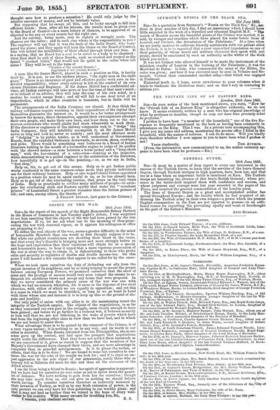SEYMOUR'S RUSSIA ON THE BLACK SEA.
23d June I56.Sta—In a quotation from Seymour's "Russia on the Black Sea," tkc., noe ticed in your number of this day, I find an inaccuracy which I should have little expected in the work of a travelled and educated English M.P. " Tip march of Munich across the beautiful plains of the Crimea was marked, it Is said, by ravages and cruelties which have placed his name beside those Of Louvois and Catinat, the devastators of the Palatinate." At a time when We are justly anxious to cultivate friendly sentiments with our gallant allies the French, it is to be regretted that a most unmerited imputation on one of their generals, of whose moral and military character they speak with just praise' should be sanctioned by such an authority as the writer of the work which you notice.
It was not Catinat who allowed himself to be made the instrument of the mistaken cruelty of Louvois in the burning of the Palatinate ; it was the Mareehal de Duras: to him, who commanded the army of the Rhine, the i
order was given; and how it was executed may be seen n Voltaire and Sis- mondi. Catinat then commanded another army—that which was engaged in Piedmont.
Historical truth is I hope, never unwelcome to your columns when it tends to vindicate the illustrious dead ; and on this I rely in venturing to address you.


































 Previous page
Previous page